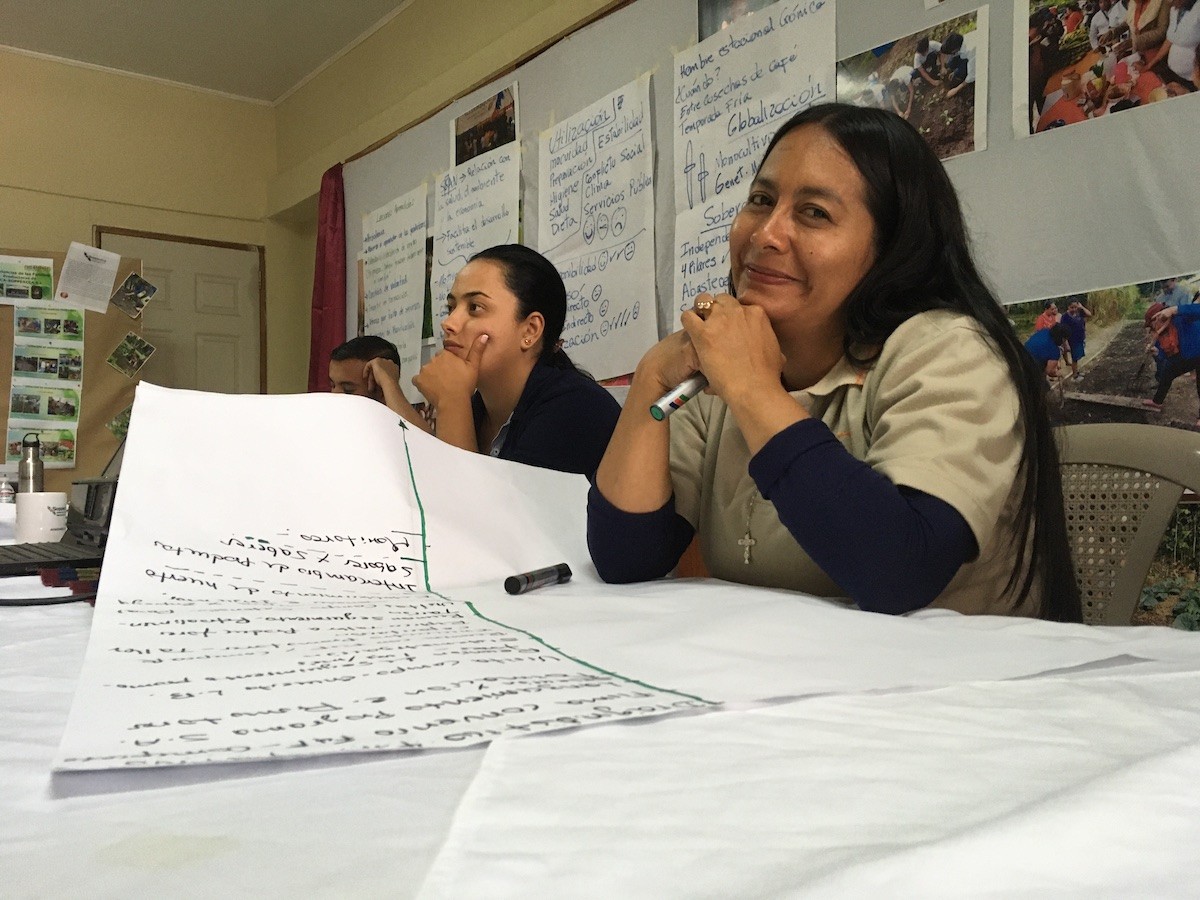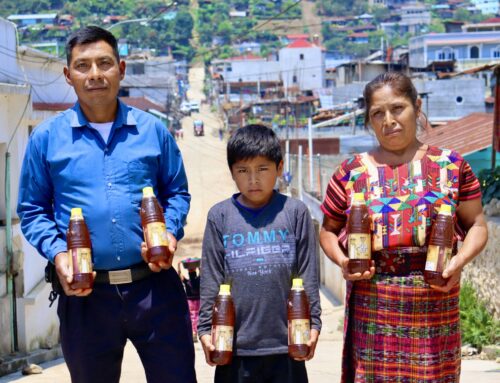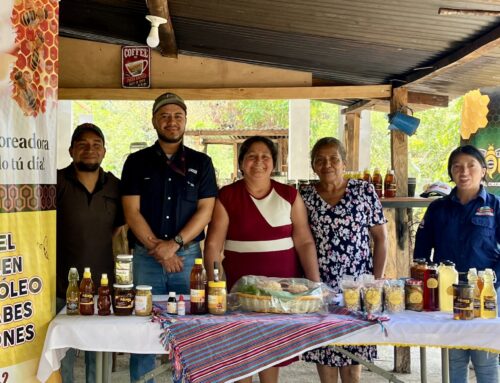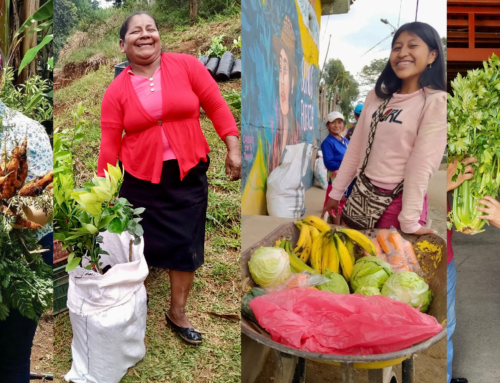Food Security Coordinators and Community Promoters are some of the most important links in Food 4 Farmers’ programs. These people breathe life into the strategies our partners create with us. They spend their days traveling to remote villages, they bring people together, they renew confidence that coffee farmers can provide for their families.
Coordinators work for our cooperative partners, but they serve the people – they are often the only person in the co-op charged with improving food security. We know that improving food security and livelihoods is a long-term process that has to reach all levels – families, students, young people, women, leadership, staff – coordinators and promoters make that vital link.
As an organization committed to collaboration, Food 4 Farmers looks for ways to bring people together to share and learn. That’s why it was so important to bring all of the coordinators together for our first-ever Coordinator Learning Exchange in mid-October.
I had the privilege of traveling to the headquarters of SOPPEXCCA, our partner in Nicaragua, to participate in the exchange. We converged on Jinotega from many different points – Guatemala, Colombia, the United States, Mexico. For some attendees, the exchange marked their first time traveling to another country. Expectations were great and the enthusiasm was, too.
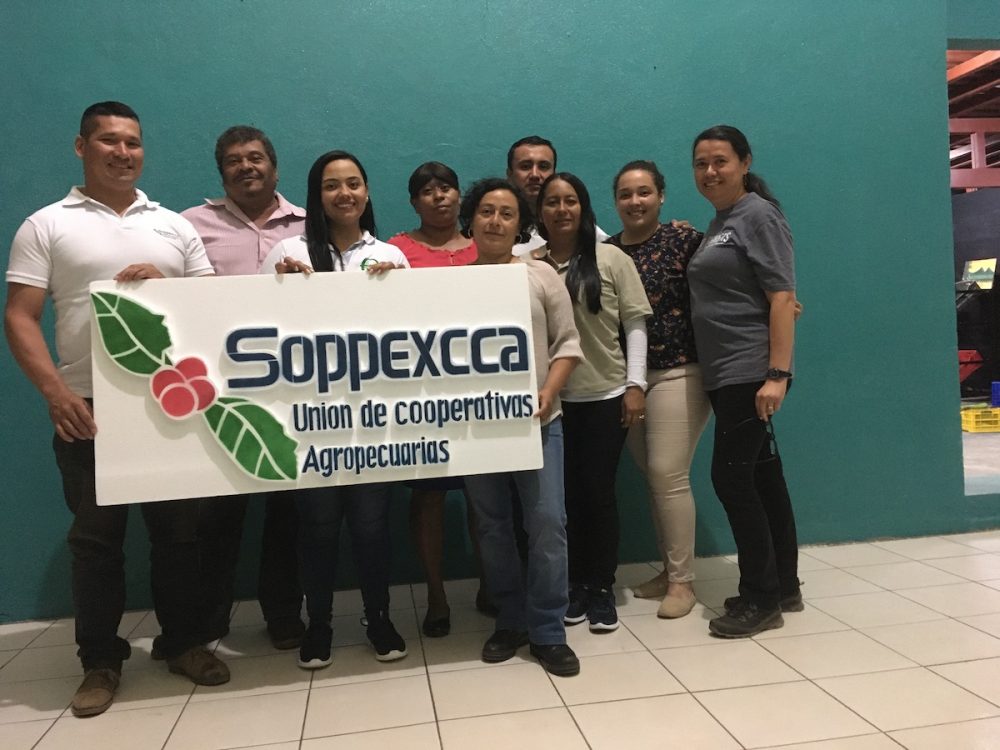
On the first day, the SOPPEXCCA leadership team gave us a warm welcome. I can still hear General Manager Fatima Ismael’s words:
“We have to open the mind, not only as producers, but as agronomists, as managers. Our cooperative is like our homeland, and we have to begin there, we need to renew our pride in being producers. Food 4 Farmers has helped us to open our minds on this.”
Then, as we went around the table sharing our names and the programs we manage, you could see eyes light up. A familiarity, even though this was the first time most of these people had met. They recognized a common vision, as well as common challenges. That week, we really worked together, to strengthen knowledge about food security, food sovereignty, and the relationship with climate change.
Luis Jimenez, Coordinator at ACODIHUE, our newest partner, said, “On a personal level, this exchange is helping me realize that I don’t consider my own food consumption habits. In our communities, people prefer a Coke rather than making a lemonade with their own lemons, which end up rotting on our farms. And most us, along with the coffee growers, do not have true food sovereignty because we prefer to produce for export, rather than grow for our own consumption.”
A big part of the exchange was learning about SOPPEXCCA’s approach to food security. On the third day, we visited the orchard of 40-year old Teresa González Palacios, who has a family of 10. Four years ago, she became a member of SOPPEXCCA, which has had a huge impact. Thanks to the food security program, her household income has increased by 15 percent, allowing her to support her daughters’ education.
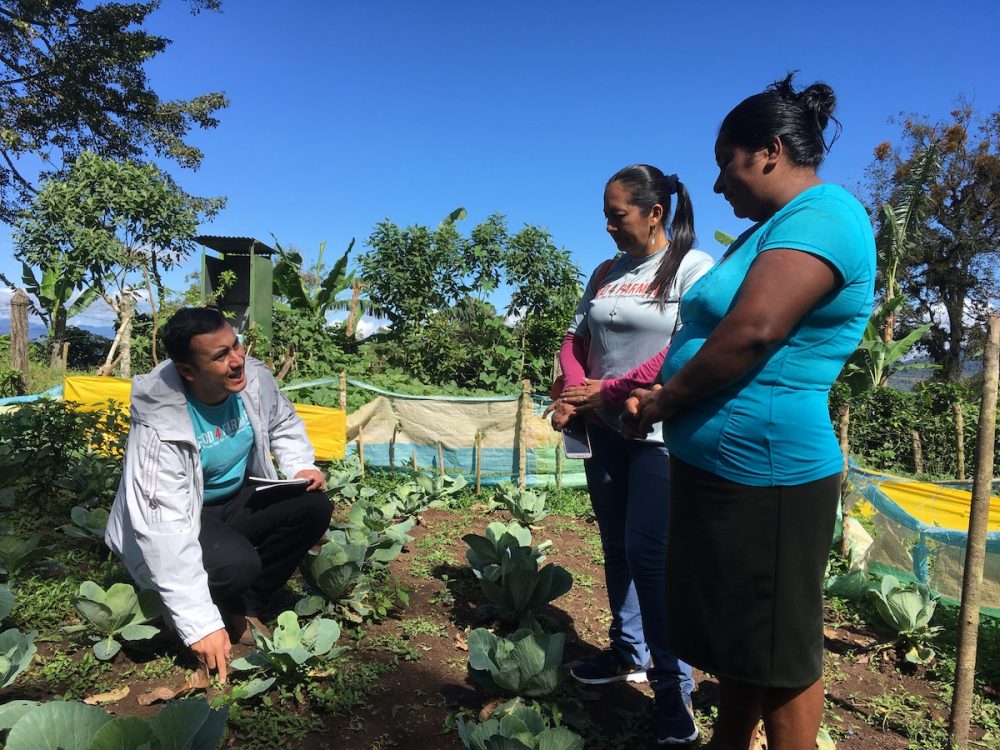
We toured Teresa’s gardens, full of lettuce, carrots, celery, onions, beets, and more. Teresa showed what she had learned in the program, utilizing organic fertilizers and applying them plant by plant. The smaller produce is reserved for consumption at home and the larger, more uniform produce is destined for the organic farmers market in Jinotega (read more about SOPPEXCCA’s farmers market here). She also demonstrated how she now diversifies her family’s diet, including cabbage she uses in different stews.
We also visited Gloria Talavera. You may recognize her from the cover of our Annual Report. The mother of three decided to participate in the food security program together with her whole family; since then, “we have fallen in love, the garden is something the whole family likes.”
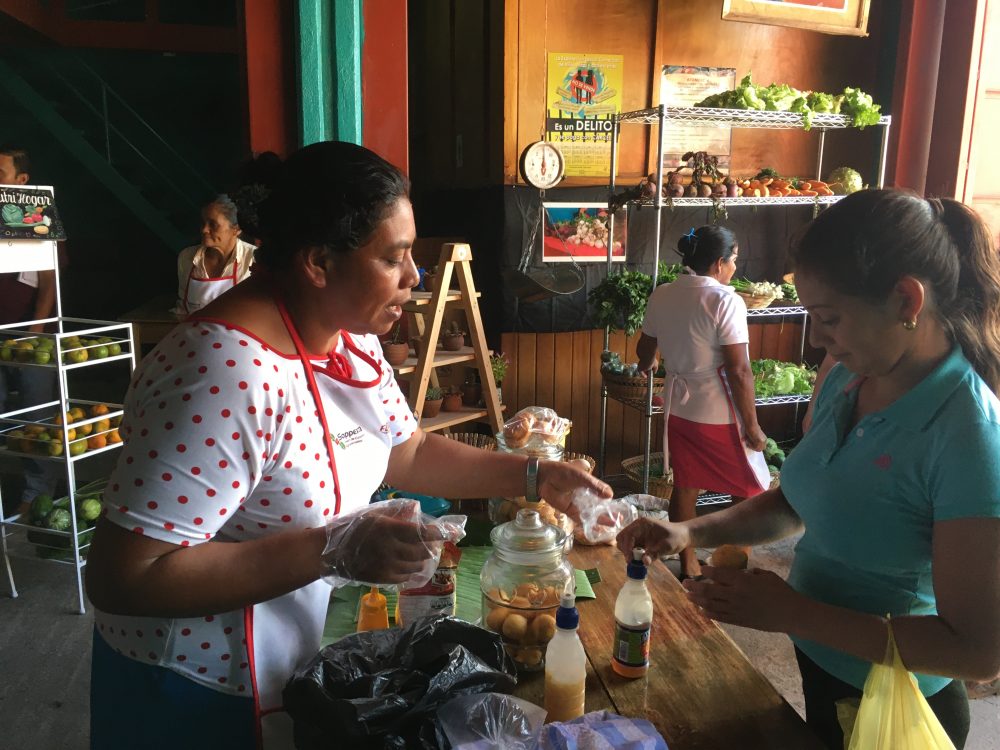
Gloria recounted the importance of sharing and learning from others, how she could bring something new to her garden and build her knowledge.
It’s no use to do 10 or 20 trainings and not apply even just a little of what we learn. When I come home, I tell my family: I saw something new and we’re going to try this,” Gloria said.
“Before the unrest in Nicaragua began in April 2018, we had established a beautiful garden. After that, there was no way we could get it to market. But the food we grew served to feed us, and we were able to sell locally.”
The next day we visited El Mercadito Nutri-Hogar, the organic farmers market run by women at SOPPEXCCA. Food security Coordinator Liliam Perez showed how they managed the market — organizing records and stock before opening the door, setting prices, and more. I sampled Gloria’s enchiladas served on banana leaves, and watched as customers milled in and the women proudly sold their produce.
“When we began, we thought the garden was only for feeding our families. We didn’t have any expectation of starting a market. But with Food 4 Farmers, and SOPPEXCCA, we have been able to create this market, and now we are better than before,” Gloria said .
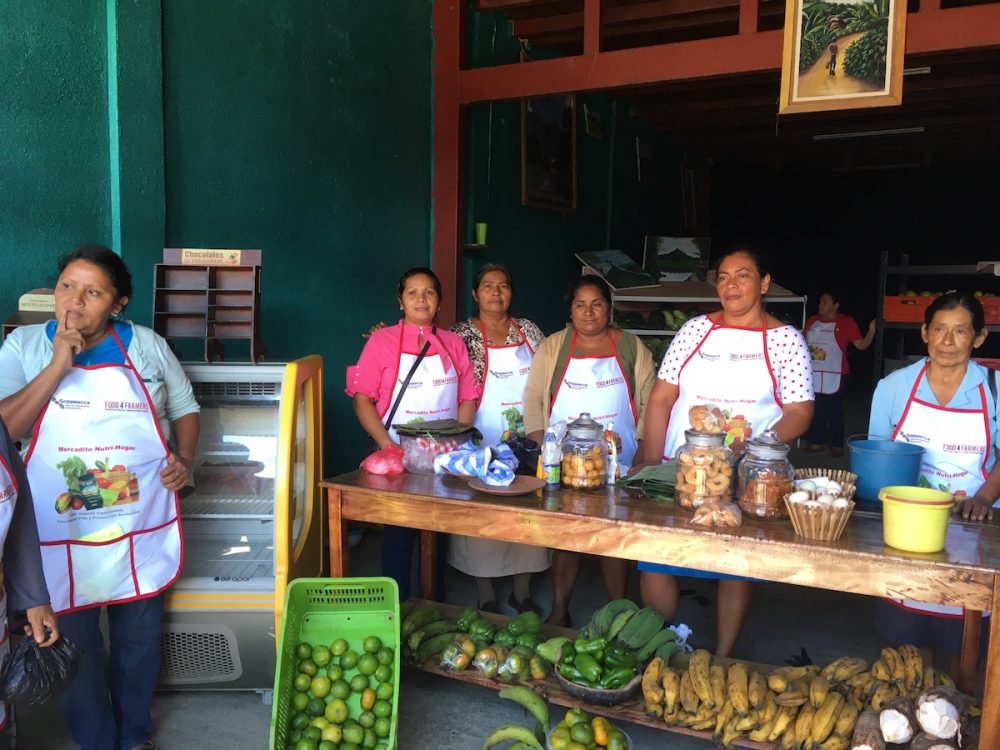
Seeing how Liliam works with cooperative management and members to implement food security strategies gave the other coordinators important real-world lessons they plan to apply in their own projects.
“I am taking a lot of ideas for our market back to Colombia with me. It’s not the same as here, but I can apply some components to make us more efficient,” said Dora Lilia Lopez, coordinator at COMEPCAFE in Colombia.
“For example, I think the families I work with would be willing to specialize in different crops, so not all of them bring the same produce to market. And I plan to encourage promoters to build relationships with local schools, so they can sell produce there.”
On the final day, we reviewed the stages of program management with a focus on those activities that generally go unseen – the reports, organizing information generated, measuring impact. We discussed strategic financial planning and keeping good control of program resources. Few people like digging into the numbers, but the coordinators were excited to see how it can become a pathway to map out the future of their programs.
For coordinators like Liliam, the exchange was extremely valuable. While she has accomplished a lot working with women in SOPPEXCCA, it’s her first job and came at a time when people were suffering the effects of political strife. She managed to successfully guide these women, and now feels better equipped to share her knowledge. At the start of the week, Liliam met Dora, the coordinator at COMEPCAFE. They’re now working together to create a workshop for improving sales with families there.
Exchanges like these can make food security coordinators feel less isolated in their work, and connect them with a readymade network to grow their knowledge, and their support systems, through camaraderie.
As the exchange came to an end, we gathered to share a delicious dinner — where joy, music and dinner were also shared generously. We hope this is just the beginning.
Special thanks to Sustainable Harvest and Mercanta whose generous support made this exchange possible.

